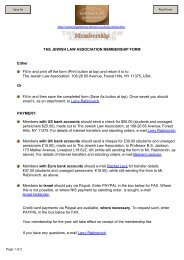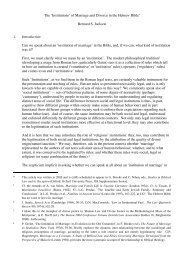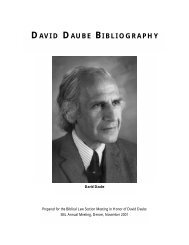Here - Deborah Charles Publications
Here - Deborah Charles Publications
Here - Deborah Charles Publications
Create successful ePaper yourself
Turn your PDF publications into a flip-book with our unique Google optimized e-Paper software.
- 20 –Moshe Yair Drori was born in Jerusalem in 1949. He received his LLB and LLM in 1970 and 1975 respectively, bothwith honors, from the Faculty of Law at the Hebrew University. In 1973, he was admitted to the Israel Bar Association,and maintained a law practice until 2001, when he was appointed as a Judge in the Jerusalem District Court. A researchfellow at the Institute of Jewish Law, the Hebrew University from 1969-1983, he was the Editorial Secretary of the firstten volumes (1974-1983) of the Shnaton Hamishpat Haivri (Annual of Jewish Law). Since 1976 he has served in variousteaching capacities at the Hebrew University, and was appointed visiting professor by the Hebrew University in 2005.Judge Drori has published three monographs and 60 articles in Jewish law, family law, and international law.Yaakov ElmanYaakov Elman (Yeshiva University) – The Grodno School (Session 11B)Traditional “learning” enjoyed a golden age with the ascent of the Brisker “Analytic” School in the 1880s until the outbreak ofWorld War II. R. Shimon Shkop (1860-1939) stands out as one of the most creative intellects of the R. Haym’s youngercontemporaries (though not strictly a disciple ), and his work was continued by two of his disciples, R. Israel Zev Gustman (1908-1991) and R. Shmuel Rozowski (1913-1979), who actually studied together in R. Shkop’s yeshiva in Grodno. These three rosheiyeshiva may collectively be considered as members of the “Grodno school.”One of the hallmarks of R. Shkop’s approach to Halakhah is his emphasis on the place of human reason in determiningboth society and halakhic norms. <strong>Here</strong> I wish to examine the view of the Grodno school of the place of that a neighboring humancharacteristic—emotion. In particular, the focus of my attention will be Shiur 16 of R. Gutsman’s Quntresei Shiurim on BavaMetzia and Chapter 2, siman 1 of Shiurei Rabbi Shmuel Rozowski on Bava Metzia as well. For R. Shkop there is of course hisclassic Sha’arei Yosher but also his hiddushim on both B.Q. and B.M. –all of which display a range of reactions to the classiceighteenth-century work of the Qetzot ha-Hoshen and the Netivot ha-Mishpat to the question of whether the emotion of ye’ush—variously rendered as “abandonment,” “renunciation,” or simply “despair”—can trigger a change of ownership, or whether itmerely sets the stage for one by neutralizing the rights of the previous owner; thus, the owner who has lost possession only losesownership when the finder, robber or thief actually acquires possession. Despite the fact that this approach to ownership surfaces inrather late rabbinic texts, the issue was already debated in Roman law, and a good argument can be made for finding its expressionin the Bavli itself. The Grodno school offers a range of analyses, depending on whether objective or subjective factors areconsidered more important, with R. Gutsman arguing for the primacy of objective ones, and R. Rozowski for the primacy of theemotional factor. The debate thus also centers on whether and to what extent we must accept the Qetzot-Netivot position, and howwe must relate the sugyot at B.Q. 66a-b and B.M. 20b-22b.Yaakov Elman is Professor of Judaic Studies at Yeshiva University and an associate of the Harvard Center for JewishStudies.Samuel FlaksSamuel Flaks (New York) – Law, Religion, and Pluralism: The Thought and Experiences of Nathan Isaacs (1886-1941) (Session8A)Nathan Isaacs was a professor of Business Law at Harvard who publicly embraced his Jewish identity at a time when that was rareat American universities. Isaacs’ academic work was organically bound to his multi-faceted activities in the American Jewishcommunity. He endorsed a pluralist vision of America in which ethnic groups would retain their cultural identities whilecontributing to the American mosaic. Isaacs encouraged fuller observance of Jewish law and he also urged that Jewish law shouldadapt to changes in society. He believed that Zionism presented the opportunity to apply the principles of Jewish law to theindustry and commerce of a modern state. Thus, he protested the classical Jewish Reform movement’s rejection of the authority ofJewish law and Zionism. Isaacs’ unique background and analysis of the history of Jewish law enabled him to craft a theory of legaldevelopment that suggested that legal systems advance in a cycle of successive periods of codification, literalistic interpretation,legal fictions, principle based interpretation, followed by legislation and re-codification. Isaacs believed that these modes of legalthinking also affected the substantive evolution of the law. Isaacs cultivated his cycle theory under the influences of Hegel, the





